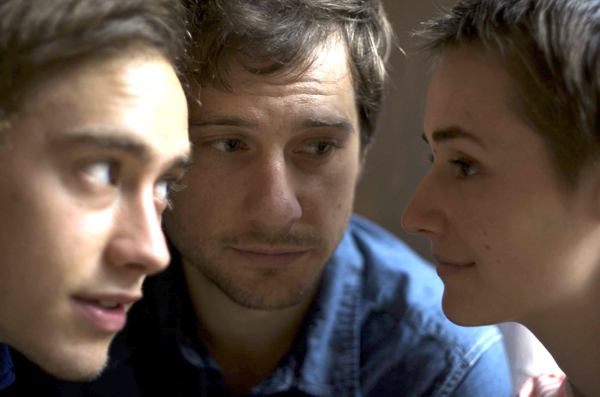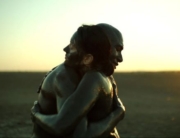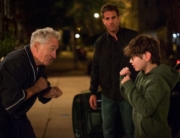Before Quentin Tarantino set the world afire with blazing guns in Reservoir Dogs, indie films were dominated by character studies of quirky people who did not quite fit in. There tended to be a sense of irony and distance that deepened rather than lessened your emotional experience. Hal Hartley was the prince of that realm while Whit Stillman ruled his stuffy little fiefdom. Of course, the downside were films that didn’t get the combo right, and what you were left with were annoying, slight characters who were doing weird things for no particular reason. This style went underground for a while but received a major face lift in Zach Braff’s affecting, if slightly cloying Golden State. Since then, the quirky film raises its head every once in a while, but few match the tone, humor, and pathos of the classics. Until Funny Bunny, that is.
Funny Bunny begins with a passionate, earnest young man named Gene going door-to-door trying to raise money to combat childhood obesity. He is obstinate and a true believer who unfortunately manages to get more doors slammed in his face than donations. He still lives with his ex-wife, who divorced him and is living with another man. That other man has had it and throws Gene out of the house. Now homeless, Gene heads to the home of a fey young man who he met while canvassing, the only one who seemed nice and who had invited Gene to come by whenever he wanted.
Barely out of his teens, Titty lives alone in a mansion he owns due to a family settlement. He’s obsessed with a young woman who he knows via webcam. She laments that her ailing rabbit is going to die unless someone sends her money for its care. That woman turns out to be Ginger, a recluse who lives alone in a ramshackle house with her rabbit and a pet pig and who is part of a bumbling animal activist group. Gene convinces Titty to find Ginger and to show his love for her by buying her a bike.
Already red flags are popping up everywhere with all this tweeness. Titty? That’s his name? And a bike, really? And there is not a single character who isn’t a pasty, young, confused, misunderstood twentysomething. Of course, they are. And yet…
Part of the problem with precocious characters is that filmmakers confuse quirks with character (also a problem seen in Tarantino knockoffs). It’s like hanging Christmas ornaments on a wire hanger and calling it a Christmas tree. It may be pretty, but it ain’t no tree. In Funny Bunny, all three of the main characters are repositories of pain and need. All their annoying tics are obvious defense mechanisms, yet they are painfully unaware of that. All three are desperate, absolutely desperate, for affection, yet they have no avenue to adequately express that. So the film turns into a heartrending dance for love. Not necessarily physical love, just simple unadorned love.
The director is Alison Bagnall, the co-writer of Buffalo ’66, and there as well as here she has a knack for making the fringiest of outcasts warm, fuzzy, and sympathetic. No small props go to the trio who play the leads: indie writer/director Kentucker Audley (Gene), Olly Alexander (Titty), and Joslyn Jensen. The chemistry between them is palpable.
Also props to the animal rescue subplot. The moment when the earnest but inept activists debate whether killing a three-year-old is morally akin to killing a pig is the perfect send-up of the ridiculous rationalization some groups will use to justify an agenda. Meanwhile, a simpler alternative, say, the idea that some pigs could be rescued from the slaughterhouse, is hiding in plain sight.
Funny Bunny is a comedy, for sure. But it’s one with a deeply sympathetic heart and an understanding of how difficult it is to simply embrace another human being when you don’t feel worthy of being touched yourself. A beautiful film.







Leave A Comment